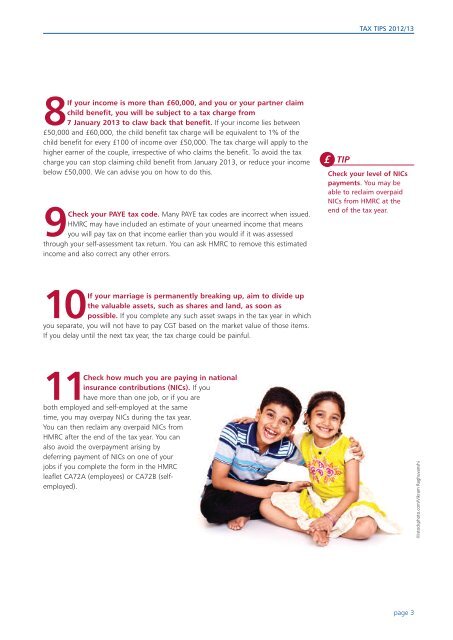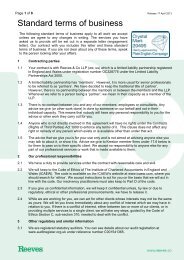clicking here - Reeves
clicking here - Reeves
clicking here - Reeves
You also want an ePaper? Increase the reach of your titles
YUMPU automatically turns print PDFs into web optimized ePapers that Google loves.
TAX TIPS 2012/13<br />
8If your income is more than £60,000, and you or your partner claim<br />
child benefit, you will be subject to a tax charge from<br />
7 January 2013 to claw back that benefit. If your income lies between<br />
£50,000 and £60,000, the child benefit tax charge will be equivalent to 1% of the<br />
child benefit for every £100 of income over £50,000. The tax charge will apply to the<br />
higher earner of the couple, irrespective of who claims the benefit. To avoid the tax<br />
charge you can stop claiming child benefit from January 2013, or reduce your income<br />
below £50,000. We can advise you on how to do this.<br />
9Check your PAYE tax code. Many PAYE tax codes are incorrect when issued.<br />
HMRC may have included an estimate of your unearned income that means<br />
you will pay tax on that income earlier than you would if it was assessed<br />
through your self-assessment tax return. You can ask HMRC to remove this estimated<br />
income and also correct any other errors.<br />
£<br />
TIP<br />
Check your level of NICs<br />
payments. You may be<br />
able to reclaim overpaid<br />
NICs from HMRC at the<br />
end of the tax year.<br />
your marriage is permanently breaking up, aim to divide up<br />
the valuable assets, such as shares and land, as soon as<br />
10If<br />
possible. If you complete any such asset swaps in the tax year in which<br />
you separate, you will not have to pay CGT based on the market value of those items.<br />
If you delay until the next tax year, the tax charge could be painful.<br />
how much you are paying in national<br />
insurance contributions (NICs). If you<br />
11Check<br />
have more than one job, or if you are<br />
both employed and self-employed at the same<br />
time, you may overpay NICs during the tax year.<br />
You can then reclaim any overpaid NICs from<br />
HMRC after the end of the tax year. You can<br />
also avoid the overpayment arising by<br />
deferring payment of NICs on one of your<br />
jobs if you complete the form in the HMRC<br />
leaflet CA72A (employees) or CA72B (selfemployed).<br />
©istockphoto.com/Vikram Raghuvanshi<br />
page 3



